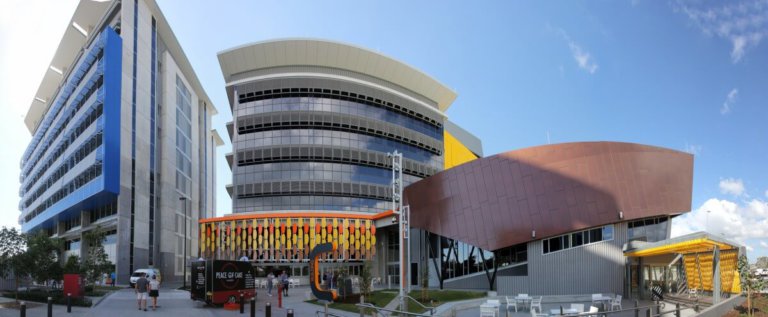
At Southern Cross University’s School of Law and Justice, students join a vibrant and exciting educational environment that encourages innovative learning in line with high academic, professional and ethical standards.
The school adopts a ‘best practice’ model in all its undertakings, which promotes the Rule of Law, human rights, social and environmental justice in a progressive, forward-facing manner.
Along with cutting-edge and socially relevant research, the School aims to attract and cultivate scholars who graduate as globally minded leaders who are capable of being innovative legal professionals.
The school offers plenty of flexibility to prospective students and has designed programmes to suit people from a range of professional backgrounds, study experiences and career aspirations.
The courses have flexible study options such as online programmes, and offers the chance for learning beyond the classroom via workshops and work placements.

Source: SCU School of Law and Justice
To gain an international perspective and broaden their horizons, law students at Southern Cross University also get the chance to study overseas as part of the elective unit component of their degree.
Through the International Exchange programme, students can travel and learn from other cultures, enriching their academic experience.
Learning experiences are offered year-round at the university, as the Summer Law School at the Gold Coast and Byron Bay campuses, as well as the Winter Law School, offer academically-rigorous yet exciting units delivered by internationally-recognised faculty who are known industry experts.
As many international students choose to stay in their host country during the summer and winter breaks, those at Southern Cross University can accelerate their degree programmes by taking up one of these units.
Here’s what’s on offer this coming Summer term (December 2019–January 2020):
The DNA and the Law course will introduce students to DNA profiling, its scientific basis and historical development.

Source: SCU School of Law and Justice
In this class, students will learn how DNA profiling is performed and explore the philosophical background to the science.
Focusing on the Australian context, the unit examines the use of DNA in court proceedings and study key cases where DNA has been utilised. The unit will also look at how developments may affect future civil and criminal court proceedings and evidence law generally.
The Public Interest Advocacy course allows students to explore the theory and practice of community activism and social change, with an emphasis on the intersection of law with these areas of social engagement.
The course will also provide students with a broad-based introduction to the skills and techniques necessary to bring about useful social change in a highly corporatised and technocratic society.
The International Business Negotiations unit will introduce students to negotiations and transactional legal practice through a structured simulated negotiation exercise.

Source: SCU School of Law and Justice
Students will represent different international companies interested in working together to exploit a new technology. The form of collaboration could be a joint venture, a licensing agreement or a long-term supply contract. The negotiations will take place through written exchanges and live negotiations.
Another innovative and interesting course offered is Justice framed: law in films and in graphic novels/comics, which introduces students to law and the visual, law and popular culture and to the fundamental concepts of visual literacy.
Students will investigate the intersection of legal and visual discourses and the idea that cinema (fiction, documentary, other genres and graphic novels/comics) are practices from which it is possible to learn about law and which can problematise legal discourse.
There’s also Performances and Power in Literature and the law which introduces students to the concept of performance and its articulation in the legal, literary and linguistic spheres, as well as the realm of the performing arts.
Students will be introduced to types of performance from literature and theatre (in its wider conception). The course will investigate the crossing and blurring of the boundaries with a specific focus on the intersections with legal culture.

Source: SCU School of Law and Justice
In the Ecological Jurisprudence class, students will be introduced to the writings of a number of authors surrounding the current reconceptualisation of nature within the legal sphere.
Students will engage with environmental policies and regulations situated in diverse philosophical frameworks. Furthermore, students will analyse a series of fundamental key case studies in the field.
The Posthumanism: Artificial Intelligence and digital ontology, literary visions, technological perspectives and legal challenges course aims to investigate the challenge of artificial intelligence (AI) for concepts of ‘volition’ and ‘personhood’ from the interdisciplinary perspectives of literature, technology and legal studies.
Students can also enrol in the online course Climate Law and Policy, which will introduce them to the range of laws and policies related to climate change at the local, state, national and international level.
The unit aims to enable students to identify legal issues related to climate change, and to critically discuss the efficacy of current and proposed legal regimes for climate change in Australia.
These courses are examples of the innovative approach Southern Cross is taking to prepare law students for the future.
By incorporating real-world knowledge and touching on socially relevant issues, learners leave equipped with the critical thinking skills and innovative mindsets needed by today’s legal professionals.
Follow Southern Cross University on Facebook, Twitter, YouTube and LinkedIn
Liked this? Then you’ll love these…
SCU Law School – A smart use of your summer
SCU Winter School: Welcoming the next generation of legal changemakers







